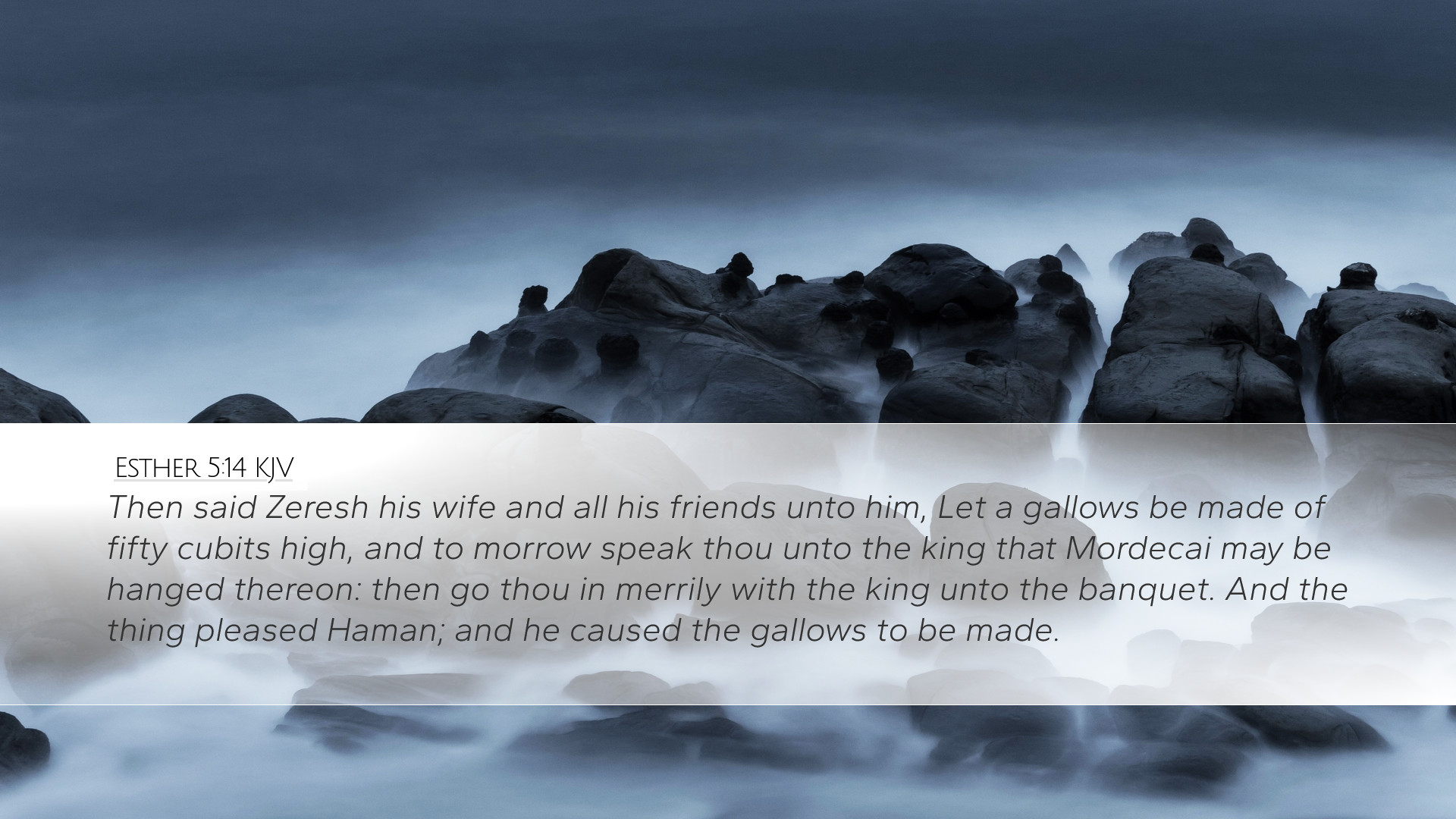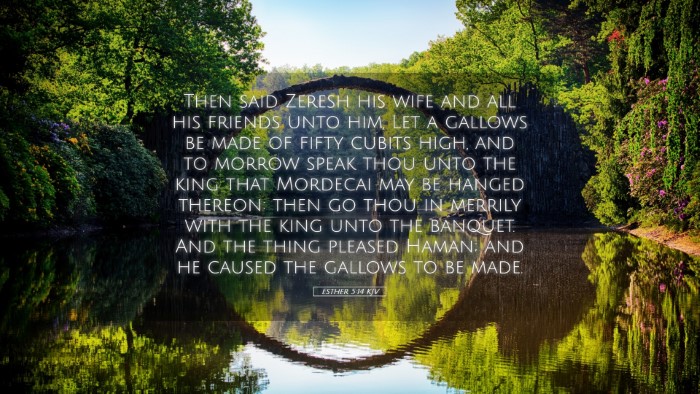Old Testament
Genesis Exodus Leviticus Numbers Deuteronomy Joshua Judges Ruth 1 Samuel 2 Samuel 1 Kings 2 Kings 1 Chronicles 2 Chronicles Ezra Nehemiah Esther Job Psalms Proverbs Ecclesiastes Song of Solomon Isaiah Jeremiah Lamentations Ezekiel Daniel Hosea Joel Amos Obadiah Jonah Micah Nahum Habakkuk Zephaniah Haggai Zechariah MalachiEsther 5:14
Esther 5:14 KJV
Then said Zeresh his wife and all his friends unto him, Let a gallows be made of fifty cubits high, and to morrow speak thou unto the king that Mordecai may be hanged thereon: then go thou in merrily with the king unto the banquet. And the thing pleased Haman; and he caused the gallows to be made.
Esther 5:14 Bible Commentary
Bible Commentary on Esther 5:14
Text of Esther 5:14 (KJV): "Then said Zeresh his wife and all his friends unto him, Let a gallows be made of fifty cubits high, and tomorrow speak thou unto the king that Mordecai may be hanged thereon. Then go thou in merrily with the king unto the banquet. And the thing pleased Haman; and he caused the gallows to be made."
Introduction
This verse captures a pivotal moment in the story of Esther, illustrating themes of pride, plotting, and divine providence. Haman, the antagonist, is consumed with rage against Mordecai and seeks to eliminate him through heinous means. The perspectives offered by public domain commentaries will delve into the implications of this verse, exploring not only the historical context but also its spiritual ramifications.
Context and Historical Background
The Book of Esther is set during the Persian Empire, a time of significant Jewish dispersion following the Babylonian exile. Haman, elevated to a position of power by King Ahasuerus, embodies the spirit of antisemitism, specifically targeting Mordecai, a Jew, who refuses to bow before him. Understanding this backdrop is crucial as it informs the reader of the stakes and the paranoia within the court of Persia.
Haman’s Pride and Plot
Haman’s plot to destroy Mordecai not only reveals his deep-seated pride but also presents a broader commentary on human sinfulness. Albert Barnes observes that Haman is motivated by jealousy and insult, traits that resonate through the ages as dangers to societal harmony.
Commentary Insights
Matthew Henry's Perspective
Matthew Henry emphasizes the moral decay observable in Haman’s actions—his wife, Zeresh, and his friends counsel him to build gallows for Mordecai. This suggests a collective endorsement of evil, indicative of a society that abandons righteousness.
- Groupthink and Evil: Henry articulates that when individuals surround themselves with like-minded conspirators, they are more likely to carry out wicked plans.
- Spiritual Blindness: Haman's inability to see beyond his immediate desires serves as a warning that power can corrupt perception.
Albert Barnes' Insights
Albert Barnes notes that the construction of a gallows, particularly one of substantial height, indicates Haman’s intent not merely to execute but to publicly humiliate Mordecai. This echoes the themes of justice and retribution that reverberate throughout biblical literature.
- Public Spectacle of Evil: The gallows serve as a stark reminder of the humiliation Haman seeks to impose. Barnes suggests that Haman's approach reflects a distorted sense of justice.
- Temporal vs. Eternal Justice: This commentary highlights the contrast between rash human judgment and God’s ultimate justice, which may be delayed but is never denied.
Adam Clarke's Commentary
Adam Clarke offers valuable reflections on the character dynamics at play. He points out that Zeresh's role as Haman's wife is crucial; she embodies the kind of counsel that encourages malevolent action rather than righteous behavior. This aligns with Clarke's observations on the biblical notion of wives as being either a source of wisdom or folly.
- Counsel of Companions: Clarke elucidates the importance of wise counsel and warns against trusting those who foster ungodly ambitions.
- Divine Sovereignty: Despite Haman's scheming, Clarke reiterates that God remains sovereign, foreshadowing that Haman’s schemes will ultimately backfire.
Theological Implications
Esther 5:14 serves as a compelling study of the moral and ethical dilemmas faced in the face of power and societal pressure. The encouragement Haman receives from those around him underscores the necessity of accountability in community.
Human Wickedness and Divine Justice
This passage vividly illustrates the proclivity for human wickedness. It warns individuals of the dangers of envy and pride, reminding believers that these attitudes can lead to destructive decisions.
Lessons for Today’s Believers
- The Danger of Misguided Counsel: Like Haman, believers must be discerning about the voices they choose to heed.
- Resisting the Urge for Revenge: The verse challenges Christians to respond to animosity with grace rather than retaliation, as represented in Mordecai’s steadfastness.
- Faith in God’s Plan: This scripture serves as a reminder that human plans may falter, but God’s purposes will prevail, often in unexpected ways.
Conclusion
Esther 5:14 encapsulates the extraordinary tension present in the narrative, acting as a springboard into deeper explorations of character, sin, and divine providence. As we reflect on this passage, may we gain a renewed understanding of the eternal truths it conveys, acknowledging our own vulnerabilities to pride and selfish ambition. The moral lessons and theological insights provided by commentators serve to guide contemporary believers towards a more righteous path in their spiritual journey.


